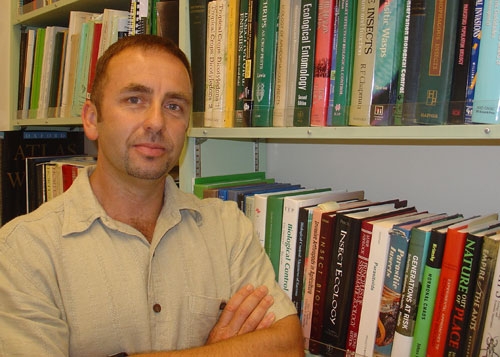Posts Tagged: Tamarixia radiata
California Report features UCCE biocontrol scientist
The public radio daily magazine program The California Report this morning featured a three-minute interview with UC Cooperative Extension biological control specialist Mark Hoddle. The interview-format story comes a day before the release of Asian citrus psyllid natural enemy Tamarixia radiata in Los Angeles County neighborhoods. Hoddle and his wife Christina Hoddle, an assistant specialist in entomology, had collected colonies of the parasitoid in the Punjab region of Pakistan.
Reporter Rachael Myrow told listeners the release of natural enemies on Friday is the first major release in a major urban area, and then allowed Hoddle to explain the developments and their implications.
For more on Tamarixia radiata, see the UC ANR press release.
Myrow also posted a story on newsfix, KQED's Bay Area news blog.
News media pick up on release of Tamarixia radiata
The first release this week in Riverside of Tamarixia radiata, a tiny wasp from the Punjab that is a natural enemy of Asian citrus psyllid, was picked by several news outlets, including the Riverside Press-Enterprise, the Porterville Recorder and the Desert Sun.
“It’s great to release these guys at long last,” the Enterprise quoted Mark Hoddle, a biological control specialist in UCR’s entomology department who for the past two years has been collecting the wasps in Pakistan.
The Recorder included a quote from Ted Batkin, president of the Citrus Research Board, a grower organization that helped fund Hoddle's research.
“This is the very first step of multiple steps in research to see if this particular strain of Tamarixia will adapt to California,” Batkin said. He said the wasp is just one of 10 or 12 tactics being studied to combat the psyllid.
The Desert Sun article had words from Aviva Goldman, a UC Riverside graduate student who works with Hoddle.
“The Asian citrus psyllid is the most potentially damaging invasive pest in California right now,” Goldman said. “These wasps are a way to treat the infestation without having to go to every person's backyard and spray pesticides on each tree."
More information about the release of Tamarixia radiata in Riverside can be found in the ANR news release.

Mark Hoddle (second from right), the director of the Center for Invasive Species Research, answers questions from the audience. (Photo: Mike Lewis)


